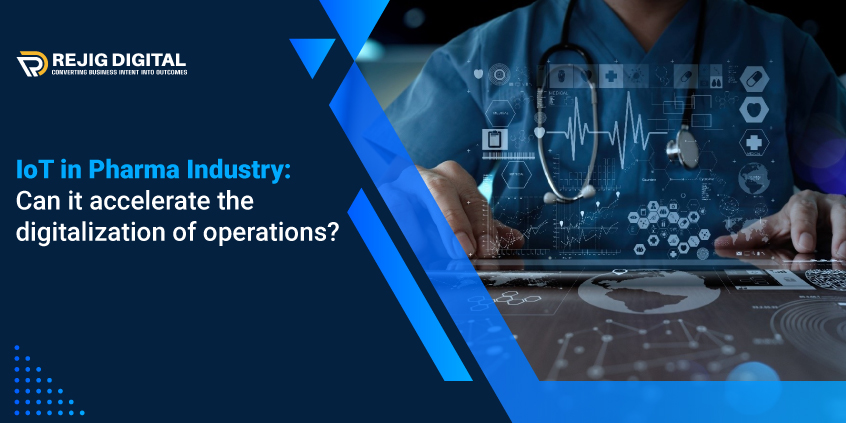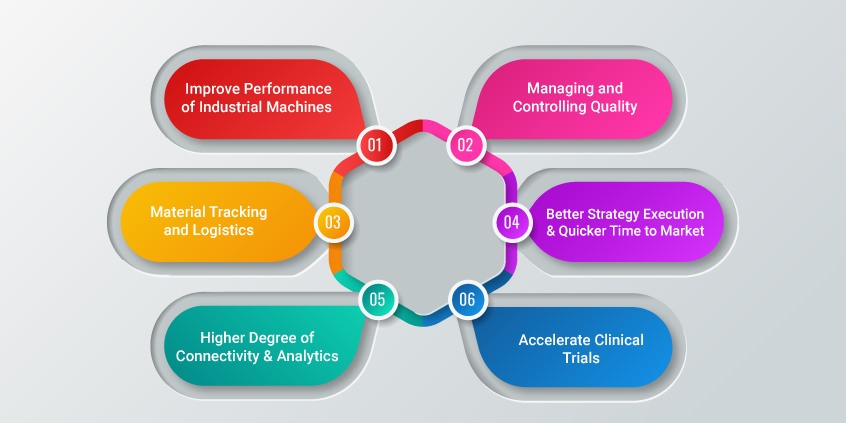
IoT in Pharma Industry: Can it accelerate the digitalization of operations?
Stage Rejigdigital
The life of the Pharma industry requires the support of advanced technologies in order to compete in the worldwide market. The present scenario, especially after the outbreak of the pandemic, demonstrates how actively the pharma industry is spending time, money, and efforts toward bringing digitalization into the frame smoothly. The demand of IoT in pharma industry is on the top to follow the path of digitalization.
Digital solutions are not new for the Pharma industry, but embracing the power of IoT is something that is a focusable point. IoT is full of potential to unlock new opportunities and possibilities to upgrade processes like communication amongst multiple departments, real-time integration, and so on.
Global Pharmaceutical Market Size to Reach US$ 2067.36 Million by 2028 at 5.70% CAGR: The pharmaceutical industry is benefiting from technological advancements. (Source)
With the aim to achieve a significant transition, IoT can be a big support for the Pharmaceutical industry to perform more robust, flexible, adaptive, and smart operations. Let’s discuss how IoT is the pillar for the pharma industry to bring digitalization.
Here are the Ways IoT in Pharma Industry Accelerate Digitalization
IoT can revolutionize the pharmaceutical sector by offering them a bunch of benefits that bring digitalization and increase efficiency and help to achieve pharma 4.0. Moreover, with IoT-gathered data, businesses are able to make fruitful decisions and tab into new opportunities for development. Let’s see how IoT has become a promising technology for the pharmaceutical industry.

1) Improve Performance of Industrial Machines
IoT helps pharma companies to improve the performance of industrial machines by enabling technical teams to continuously monitor and track the condition of the machines and equipment.
The data is collected and analyzed by the IoT system, transmitted to the responsible person. Also in critical situations or any abnormal condition that occurs in the machine and during the operation, the IoT system notifies the supervisor about the maintenance needs.
Additionally, an IoT-powered application or solution has the potential to take action or respond to the specific machine condition. Digital Manufacturing in Pharma Industry helps to prevent machine failure or accidents. Thus, we can say that with the integration of IoT, the pharma industry can achieve smart manufacturing.
2) Material Tracking and Logistics
The pharmaceutical sector can benefit from the usage of the Internet of Things (IoT) to enhance logistics and material tracking. IoT sensors, for instance, can be affixed to pharmaceutical material containers, enabling real-time surveillance of their position and state throughout transportation. This can guarantee that goods are handled and kept properly to preserve their quality and efficacy as well as that they are transported to their destination in a timely way.
Furthermore, Industrial 4.0 in pharma can increase supply chain efficiency by lowering the need for human material tracking and monitoring and by enhancing insight into the flow of goods across the supply chain.
3) Higher Degree of Connectivity and Analytics
No doubt, IoT-based solutions empower pharmaceutical companies in several ways. Providing a high degree of connectivity and analytics are two of them. We all know IoT is the collection of connected devices, sensors, and networks that facilitates communication and data flow from one object to another.
Hence, IoT solutions enable the pharma industry to make better connections between different devices and systems integrated under the pharmaceutical ecosystem. Connected devices allow pharma companies to operate more efficiently and streamline a variety of operations.
For example, IoT sensors can track the temperature of the space where drugs are stored in order to eliminate the risk of it ruining it and increasing the overall production cost.
Providing information on various ongoing operations – is another way IoT solutions are helping other businesses including Pharmaceutical. With great insight into different businesses, workflows enable them to make better decisions.
For example, IoT sensors or devices gather data on the production, distribution, and use of drugs, which will undergo multiple analyzing processes to identify trends, optimize supply chain management, and improve patient outcomes.
4) Managing and Controlling Quality
IoT-connected devices and sensors provide power to the production team to closely track and monitor the production process from start to end. Getting data on product status at different stages to ensure they meet production standards and focus more on highly crafted solutions for better user experience.
After the production stage, the IoT solution brings transparency and efficiency in the phase of supply chain management enabling staff to perform a seamless operation by tracking the movement of products till reaching the retailer.
One of the main reasons IoT-powered applications help in controlling quality and managing production with the potential of predictive maintenance. By gathering real-time data which provides detailed information on asset performance and health as well. Considering critical situations, predictive maintenance notifies staff about upcoming machine downtime.
This helps pharma manufacturing to efficiently manage and control the quality of drugs without escalating the outline of operation costs.
5) Better Strategy Execution and Quicker Time to Market
There are a few factors that completely affect the strategy execution and quicker time to market: Efficiency, faster decision-making, streamlined collaboration, and output. IoT in pharma sector helps to set mentioned factors fully.
IoT application permits the pharma industry to optimize the N number of processes such as production, supply chain management, and asset performance measurement activities. Hence, with real-time insight and optimized operations pharmaceutical companies are capable of experiencing a higher degree of process efficiency.
Accurate and meaningful information collected and stored in the IoT ecosystem helps pharma companies to make more mature decisions regarding business for a better future and stay competitive. Another way, IoT facilitates communication and collaboration between the teams which makes it easier to produce effective drug solutions for society.
6) Accelerate Clinical Trials
In clinical trials, IoT devices can be used to remotely monitor patients. Wearable devices, such as watches, can keep a record of a patient’s vital signs, physical activity, and other health metrics in real-time and transmit them back to trial organizers. In this way, researchers can identify the adverse effects of a drug and monitor its safety and efficacy more accurately.
The collection and analysis of data can also be made more efficient using IoT. It is possible to collect data using IoT sensors from a variety of sources, such as electronic medical records, patient feedback, and clinical trial results. Researchers can use machine learning algorithms to analyze this data in real-time to identify trends and patterns that would have been invisible to them otherwise.
Concluding Lines for IoT in Pharma Industry
The continuous evolution in the pharma industry emphasizes them to move forward at the right pace and with the right Software Solution for Pharma Industry. IoT in pharma sector helps them to serve the world with top-notch medical solutions, services, and products with faster speed.
Are you looking to embrace the power of the Internet of Things in order to upgrade your pharmaceutical operations? We are here to assist you. Rejig Digital is the fastest-growing digital transformation services provider company that offers a wide range of technological solutions including IoT and IIoT. Also, help all sizes of industries to integrate digital solutions more smoothly than ever.
